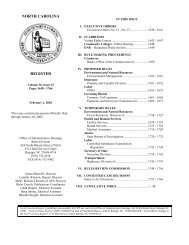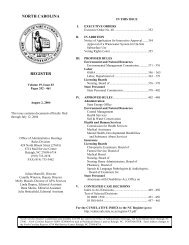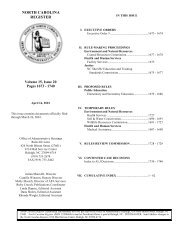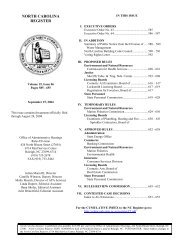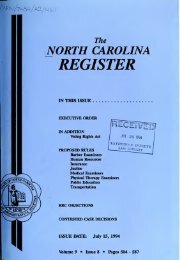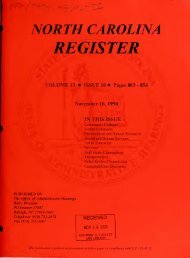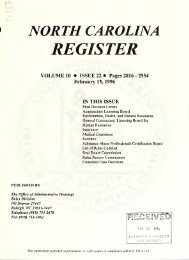NC Register Volume 23 Issue 09 - Office of Administrative Hearings
NC Register Volume 23 Issue 09 - Office of Administrative Hearings
NC Register Volume 23 Issue 09 - Office of Administrative Hearings
Create successful ePaper yourself
Turn your PDF publications into a flip-book with our unique Google optimized e-Paper software.
APPROVED RULES<br />
and are paid for their work and assume a gradual degree <strong>of</strong><br />
responsibility for their own needs.<br />
(f) The residential child-care facility shall provide children who<br />
are on work assignments with adult supervision.<br />
(g) The residential child-care facility shall ensure that children's<br />
work assignments do not interfere with school, recreation, study<br />
period, adequate sleep, community contacts and family time.<br />
History Note: Authority G.S. 131D-10.5; 143B-153;<br />
Eff. July 1, 1999 (See S.L. 1999, c. <strong>23</strong>7, s. 11.30);<br />
Amended Eff. October 1, 2008; July 18, 2002.<br />
10A <strong>NC</strong>AC 70I .0613 DISCIPLINE AND BEHAVIOR<br />
MANAGEMENT<br />
(a) A residential child-care facility shall have written policies<br />
and procedures on discipline and behavior management,<br />
including the type and use <strong>of</strong> physical restraint holds, if utilized.<br />
A copy <strong>of</strong> the written policies and procedures shall be provided<br />
to and discussed with each child and the child's parents, guardian<br />
or legal custodian prior to or at the time <strong>of</strong> admission. Policies<br />
and procedures shall include:<br />
(1) proactive means for interacting with and<br />
teaching children which emphasize praise and<br />
encouragement for exhibiting self control and<br />
desired behavior; and<br />
(2) methods for protecting children and others<br />
when a child is out <strong>of</strong> control.<br />
(b) A residential child-care facility shall implement standards<br />
for behavior which are reasonable and developmentally<br />
appropriate.<br />
(c) A residential child-care facility shall not engage in discipline<br />
or behavior management which includes:<br />
(1) corporal and physical punishment;<br />
(2) cruel, severe, or humiliating actions;<br />
(3) discipline <strong>of</strong> one child by another child;<br />
(4) denial <strong>of</strong> food, sleep, clothing or shelter;<br />
(5) denial <strong>of</strong> family contact, including family<br />
time, telephone or mail contacts with family;<br />
(6) assignment <strong>of</strong> extremely strenuous exercise or<br />
work;<br />
(7) verbal abuse or ridicule;<br />
(8) mechanical restraints;<br />
(9) a drug used as a restraint, except as outlined in<br />
Paragraph (e) <strong>of</strong> this Rule;<br />
(10) seclusion or isolation time-out; or<br />
(11) physical restraints except as outlined in<br />
Paragraph (f) <strong>of</strong> this Rule.<br />
(d) Time-out means the removal <strong>of</strong> a child to a separate<br />
unlocked room or area from which the child is not physically<br />
prevented from leaving. The residential child-care facility may<br />
use non-isolation time-out as a behavioral control measure when<br />
the facility provides it within hearing distance and sight <strong>of</strong> a staff<br />
member. The length <strong>of</strong> time alone shall be appropriate to the<br />
child's age and development.<br />
(e) A drug used as a restraint means a medication used to<br />
control behavior or to restrict a child's freedom <strong>of</strong> movement and<br />
is not a standard treatment for the child's medical or psychiatric<br />
condition. A drug used as a restraint shall be employed only if<br />
required to treat a medical condition. It shall not be employed<br />
for the purpose <strong>of</strong> punishment, staff convenience or as a<br />
substitute for adequate staffing.<br />
(f) Physical restraint <strong>of</strong> a child means physically holding a child<br />
who is at imminent risk <strong>of</strong> harm to himself or others until the<br />
child is calm.<br />
(g) Physical restraint holds shall be administered only by staff<br />
trained in the use <strong>of</strong> physical restraint holds. No child or group<br />
<strong>of</strong> children shall be allowed to participate in the physical<br />
restraint <strong>of</strong> another child.<br />
(h) Before employing a physical restraint, the residential childcare<br />
facility shall take into consideration the child's medical<br />
condition and any medications the child may be taking.<br />
(i) No child shall be physically restrained utilizing a protective<br />
or mechanical device. Physical restraint holds shall:<br />
(1) not be used for purposes <strong>of</strong> discipline or<br />
convenience;<br />
(2) only be used when there is imminent risk <strong>of</strong><br />
harm to the child or others and less restrictive<br />
approaches have failed;<br />
(3) be administered in the least restrictive manner<br />
possible to protect the child or others from<br />
imminent risk <strong>of</strong> harm; and<br />
(4) end when the child becomes calm.<br />
(j) A residential child-care facility shall:<br />
(1) ensure that any physical restraint hold utilized<br />
on a child is administered by a trained staff<br />
member with a second trained staff member in<br />
attendance. An exception may occur when no<br />
other staff member is present or can be called<br />
for immediate assistance. Concurrent with the<br />
administration <strong>of</strong> a physical restraint hold and<br />
for a minimum <strong>of</strong> 15 minutes subsequent to<br />
the termination <strong>of</strong> the hold, a staff member<br />
shall monitor the child's breathing, ascertain<br />
the child is verbally responsive and<br />
motorically in control, and ensure the child<br />
remains conscious without any complaints <strong>of</strong><br />
pain. If at any time during the administration<br />
<strong>of</strong> a physical restraint hold the child complains<br />
<strong>of</strong> being unable to breathe or loses motor<br />
control, the staff member administering the<br />
physical restraint hold shall immediately<br />
terminate the hold or adjust the position to<br />
ensure that the child's breathing and motor<br />
control are not restricted. If at any time the<br />
child appears to be in distress, a staff member<br />
shall immediately seek medical attention for<br />
the child. Following the use <strong>of</strong> a physical<br />
restraint hold, a staff member shall conduct an<br />
interview with the child about the incident, and<br />
the staff administering the physical restraint<br />
hold shall be interviewed about the incident;<br />
(2) document each incident <strong>of</strong> a child being<br />
subjected to a physical restraint hold on an<br />
incident report. This report shall include the<br />
following:<br />
(A) the child's name, age, height and<br />
weight;<br />
(B) the type <strong>of</strong> hold utilized;<br />
<strong>23</strong>:<strong>09</strong> NORTH CAROLINA REGISTER NOVEMBER 3, 2008<br />
830




